

Social Media Literacy: The Five Key Concepts. Online digital technology has empowered users in ways that were unimaginable twenty years ago.
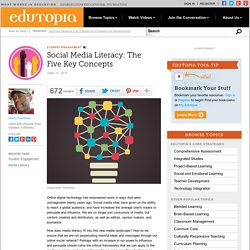
Social media sites have given us the ability to reach a global audience, and have increased the average user's means to persuade and influence. We are no longer just consumers of media, but content creators and distributors, as well as editors, opinion makers, and journalists. How does media literacy fit into this new media landscape? How do we ensure that we are not perpetuating harmful ideas and messages through our online social network?
Perhaps with an increase in our power to influence and persuade should come the critical frameworks that we can apply to the media we create, and not just the media we consume. So how can we create a media literacy framework that takes into account our power and participation in the media? I thought it would be best to go back to the basics, and review the five concepts of media literacy. The Origin of the Five Concepts. Digital Literacy Definition and Resources. What is Digital Literacy?
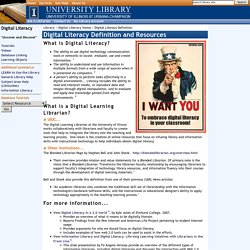
The ability to use digital technology, communication tools or networks to locate, evaluate, use and create information. 1The ability to understand and use information in multiple formats from a wide range of sources when it is presented via computers. 2 A person’s ability to perform tasks effectively in a digital environment... Bloom actions-activities. Digital_literacy.
Digital Literacies and Apps by Tamas Lorincz on Prezi. Is technology a silver bullet for language teaching and learning? "There is no longer a four-walled classroom," says Dr Cecilia Goria, of Nottingham University's Language Centre.
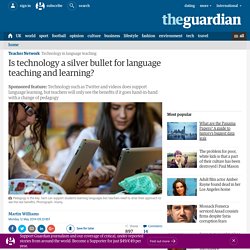
"Teaching and learning now extends beyond that. " Technological innovations have changed language learning radically from the old-fashioned image of pupils learning lists of verbs out of textbooks. Although language teaching has a long history of using tech, dating back to the 1960s, recent developments such as social networking and easy-to-use video cameras have removed many of the limitations.
Whereas using tech may have once meant a weekly trip to a computer lab, it can now involve anything, from Facebook and Twitter to podcasts and videos in the classroom. The question is: should teachers try to evolve their teaching to fit with the latest gadgets, or should they stick to their old ways? Those who use tech say the advantages are obvious. Using tech means that students can now turn to Twitter to use the language, without having to pack the class off on a school trip.
Digital Literacy for Personalized Learning. 6 Cs of a Digital Pedagogy. Following on from the Higher Education Academy's excellent Digital Humanities summit, I've been doing some thinking around the digital skills that we expect students to acquire.
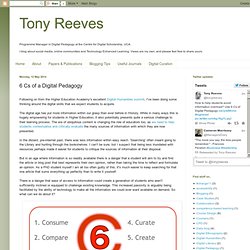
The digital age has put more information within our grasp than ever before in History. While in many ways this is hugely empowering for students in Higher Education, it also potentially presents quite a serious challenge to their learning process. The era of ubiquitous content is changing the role of educators too, as we need to help students contextualise and critically evaluate the many sources of information with which they are now presented. In the distant, pre-internet past, there was less information within easy reach. 'Searching' often meant going to the Library and hunting through the bookshelves. There is a danger that ease of access to information could create a generation of students who aren't sufficiently inclined or equipped to challenge existing knowledge. Does this model work for you? DigitalLiteracies-DudeneyHocklyPegrum-Extract. Gallery.mailchimp.com/251bb99b55142eb85a85a6463/files/NN_Spring_12_screen_FINALlowres. Digital Literacies, by Nicky Hockly, The Consultants-E.
No place in class for digital illiterates. Show and tell ...
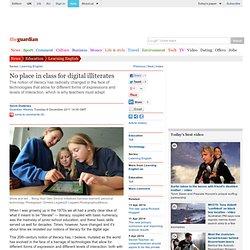
Bring Your Own Device initiatives harness learners' personal technology. Photograph: Dimitris Legakis/D Legakis Photography/Athena When I was growing up in the 1970s we all had a pretty clear idea of what it meant to be "literate" — literacy, coupled with basic numeracy, was the mainstay of junior-school education, and these basic skills served us well for decades. Times, however, have changed and it's about time we revisited our notions of literacy for the digital age.
This 20th-century notion of literacy has, I believe, mutated as the world has evolved in the face of a barrage of technologies that allow for different forms of expression and different levels of interaction: both with media and with other readers, writers, producers and editors. While we talk of ELT, ESL, Esol, in other spheres people increasingly refer to DSL – Digital as a Second Language. So is the digital world so wildly different from the analogue one most of us grew up in? List.